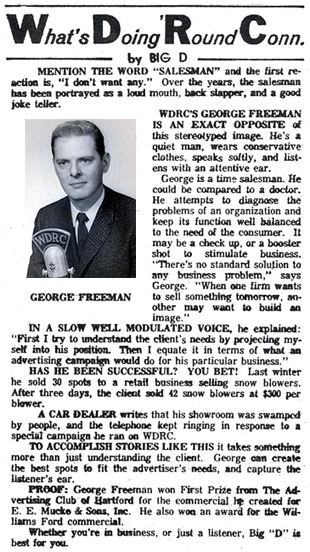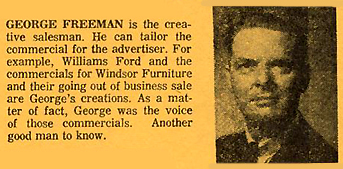
©
2007-2025
Man From Mars Productions
|
George
Freeman
|
 |
|
Q: Suddenly, it's 1961 and you're back at WDRC but this time you're off the air with a desk in Mike Boudreau's sales department. Tell us about him. A: He described himself as "Harvard's token Catholic". He was a Harvard graduate. Wore expensive Italian-made shoes. Mike lived in New Britain. He had worked for a credit company setting up floor plan financing for car dealerships. When he was fired he answered a newspaper ad for an account executive position at DRC. He had never been in a radio station before. He told us he had little or no training, was given a rate card and told to hit the street. Mike told us he had to figure radio sales out for himself. And he did. He called on all the car dealers who were his former customers. His pitch was the same to each: "buy 100 announcements a week, 52 weeks a year." That was the order. In each case the dealer asked if this would work and Mike, using common sense, could safely say, "yes." Mike was not much at writing continuity so he'd bring his orders back to Charlie Parker and me. Charlie would create the campaigns for each of his car dealers. I remember three. Jones Ford, East Harford (campaign featured the 1954 song "Cross Over The Bridge"); Williams Ford, West Hartford (I created this campaign and wrote the copy, recording each commercial for years at WDRC, then at WCCC where I created a budget which had heretofore not existed. I did the voice of the non-existent Mr. Williams using an imitation of the evil Wisconsin senator Joe McCarthy); and Charlie wrote Capitol Motors, downtown Hartford. Witness the math; three dealers X 300 announcements per week X 52 weeks = 15,600 announcements per year. Using his car connections Mike had created a year's income which turned into a long-term source for revenues for himself by making those three sales. When they closed the TV-18 sales department I called WDRC on behalf of a middle aged insurance man who had left his insurance career to enter broadcasting. He had a family and I feared for him. I was very surprised when Mike Boudreau called me and asked why I hadn't called on behalf of myself. I reminded him I had called Bill Crawford before I went into sales to ask for a job in sales at Big D. Bill responded something like, "I had to fire you once as news director. I wouldn't like to have to fire you again." Mike said he wanted me to come to work for him. Wanted to take me to lunch. I demanded that Crawford be at the table. Mike showed up with Bill and we got together. Mike hired me in spite of what I did to him when I was news director in 1960. I had dropped in his office to tell him about our great election coverage plans and urged him to sell this special programming. He told me he would not sell it. I immediately drafted a memo to New York detailing our news plans and urging sale of the special programming, going over Mike's head. The word came back to Mike that, indeed, this must be sold. Mike sold it. And I wondered how much of an enemy I had made. I learned later he was too big a man to be vindictive. |
 What's Doing "Round Connecticut column - April 19, 1964 |
Some years later, in the late 1970's I visited Hartford, checked into a downtown Hartford hotel and phoned Mike Boudreau. He came over on the bus to visit me. He was surprised that I would take the trouble to look him up. It was a chance for me to tell him how good an influence he had been on me and my appreciation for his mentoring and most of all his examples of even-handed fairness. Q: Something else you don't hear much anymore is a single commercial surrounded on either side by a song. How do you feel about clustering spots in four or five minute blocks instead of the 1960s-way of integrating them into the program? A: In the Swingin' Sixties most portable radios did not have push buttons so it wasn't as easy to dial from 1360 WDRC to 1410 WPOP, the other rock 'n roll station. Therefore spot clusters weren't as dangerous to program for fear of losing an audience. Newscasts, however, did cost us the rock-n-roll lovers. As soon as a newscast on either of the stations came on you could almost feel the audience leave for the other top 40 station's hit music. |
